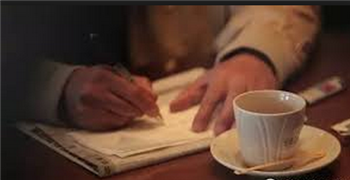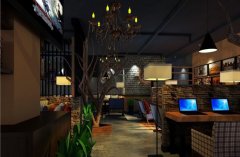Coffee is an index of Western symbols.

During the Cultural Revolution, the trinity of coffee, cream and bread became a symbol of corrupt ideology in the West. It implies the meaning of corruption, extravagance, indulgence and betrayal. It is a negative sign of Puritan politics, marking a sinful way of life. But the revolutionary flag bearer Jiang Qing herself is the biggest fan of "bourgeois coffee". She monopolizes the right to drink coffee in Zhongnanhai. Across the red briefing waiting for review on the desk, the lips of China's first lady secretly collided with the delicate porcelain cups, emitting low admiration. This is a historic moment for the implementation of coffee dictatorship. Coffee turned its back on the public and slept with the supreme power.
A few years later, as a petty bourgeoisie, I bought coffee tea, a lump of shoddy coffee and sugar, from a small shop called cigarette paper shop. I fried the candy in a medical disinfectant pan, then giggled with my classmates and sipped it in a glass. This is the result of the gradual relaxation of living controls in the later period of the Cultural Revolution. Since Marx and Lenin were both customers of coffee, the drink was liberated after the crackdown. But it is said to be coffee, rather than some kind of ridiculous industrial substitute, emitting a bad sweet smell. Nevertheless, the taboo "coffee" has made a comeback.
Coffee is an index of Western symbols, or a soft fragment of large Western text. Drinkers expect to feel the smell of external civilization from there. Drinking coffee is a cultural betrayal, but it is also an expression of physical desire. Throughout puberty, I was fascinated by this drink. The powder of the crushed plant fruit melts in water and becomes a dark brown liquid with an indescribable aroma. It is a liquid cigarette that uses caffeine to moisturize nerves and evoke nameless passion within the body. It is an ideological aphrodisiac that nurtures the rebellious beliefs of a generation of cultural prisoners. Small grains of coffee
A TV documentary about coffee left a deep impression on me. There is a Shanghai "Lao Kela" (a group with religious worship of colonial culture) who never married in order to guard the family property. He is the kind of dedicated watcher who is voluntarily imprisoned in the mission entrusted by overseas families. When the large-scale urban renewal movement was launched, his small house was sentenced to death. On the eve of being demolished, Old Kera made himself a cup of instant coffee and spent the last night in the building. Coffee was the only thing he used to comfort himself. The stubborn camera followed him all the time. His eyes filled with tears as the dawn light rose slowly in the room. These are tears mixed with coffee solution, and it is also his last line for the audience. Coffee trade
Imported instant coffee once dominated the whole 1980s. Due to the addition of some substitutes, the aroma of "Nestle" is fleeting in the brewing process, leaving only a bad sour taste. It is an inferior western image, but it has become the pillar of the new economy, and it is also a mirror image of people's colonialism nostalgia and western imagination. At the same time, cafes began to breed on a large scale, peddling expensive instant coffee and Western flavors to customers. Tea was given the cold shoulder, and drinking coffee became a modern ritual, implying a farewell to the old way of life. Barista
It is only in the West that the consolation of coffee can be restored to its pristine state. During my eight years in Sydney, coffee has almost become my main daily companion. During my lunch break, I like to go to the cafe below the office building, ask for a cup of coffee for two yuan, sit on the street terrace and drink slowly, surrounded by endless beauties and blue orchids. At dusk in summer, I would drive to the beach for a swim, then sit in a nearby cafe and look out lonely at the darkening night sky of the South Pacific. The skin washed by sea water becomes cool and delicate. The warm current of coffee slowly passed through my body. Caffeine, like a mutated alcohol, ignites the blood, causes it to burn under streetlights, and leaves a secret mark in the body. And I have an insight into what's going on in me.
The semantics of this coffee discourse are constantly changing. Since the height of summer, during the school holidays, I often go to Starbucks in the South Mall with a few friends who live close to me, have a cup of mocha or cappuccino, and use straws to extract foam, coffee liquid and sugar from the bottom of the sedimentation cup. Talk about semiotics, deconstruction and signifier crises. This kind of conversation is mixed with the sensory pleasure and metaphysical pleasure of coffee. The coffee is taken away by the customers themselves from the cooking table, and the small round table and wooden chairs can be combined arbitrarily. These free factors change the relationship between consumers and the cafe, making the whole space permeated with a comfortable atmosphere. The small room was filled with couples, salon gatherers and single scholars. Their expressions and gestures were relaxed, and they were bathed in the brilliance of coffee. A waiter came up to our next table and picked up the used cups. He behaved skillfully, but his eyes were indifferent. He is the only outsider in this public space.
Important Notice :
前街咖啡 FrontStreet Coffee has moved to new addredd:
FrontStreet Coffee Address: 315,Donghua East Road,GuangZhou
Tel:020 38364473
- Prev

The strange posture of Italians in drinking coffee
It turns out that Italy is narrow and densely populated, with an inch of land and gold. If so many cafes were seated, it would not only occupy an area of land but also cost money. So they chose to stand up to drink, anyway, the authentic Italian steam coffee is extremely strong, refreshing and refreshing, even standing for a while does not feel very tired. Another advantage of standing up to drink coffee is to drink and go quickly so that you can make room for others. The coffee that Italians often order is called ESPRESSO.
- Next

The origin of coffee shop Cafe is a place for people to communicate with each other for leisure and business.
A coffee shop is also called a coffee shop. The earliest cafe, called Kaveh Kanes, was built in Mecca. Although originally for a religious purpose, these places soon became centers for playing chess, chatting, singing, dancing and listening to music. Since Mecca, cafes have spread all over Asia.
Related
- How did the Salvadoran coffee industry develop in Central America?
- What exactly does the golden cup extraction of coffee mean?
- The Origin of Coffee flower
- [2023 Starbucks World Earth Day] there are more meaningful things besides free Starbucks coffee!
- What kind of coffee is there in Spain? 9 Flavors of Spanish Coffee
- Aromatic African coffee| Kenya's coffee culture and historical production area
- Liberica Coffee Bean knowledge: the characteristics of Liberian Coffee beans of the three original species of Coffee beans
- The origin and formula of Spanish latte introduces the taste characteristics of Bombon coffee in Valencia, Spain.
- How to adjust the solution of over-extracted coffee
- What is the tasting period of coffee beans? What is the period of coffee and beans? How should coffee wake up and raise beans?

